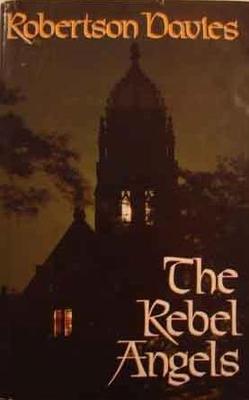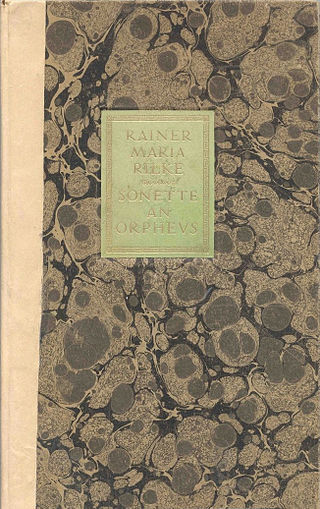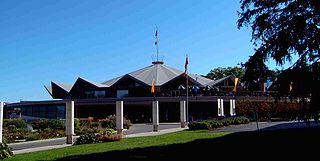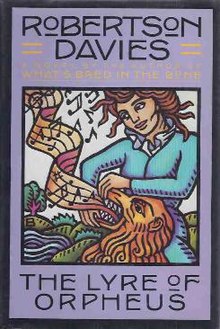Plot
In The Lyre of Orpheus, the executors of the will of Francis Cornish (the subject of What's Bred in the Bone) find themselves at the head of the "Cornish Foundation". The directors of the Foundation, who are the three remaining Frank Cornish's estate executors, being Professor the Reverend Simon Darcourt, Arthur Cornish, and Maria Cornish, plus Professor Clement Hollier and Stratford, Ontario actor Geraint Powell, are called upon to decide what projects deserve funding. They decide that an unfinished opera by E. T. A. Hoffmann will be finished and staged at Stratford; to this end, they hire a brilliant young composition student, Hulda Schnakenburg ("Schnak"), to complete the opera as her PhD. dissertation, while Darcourt is charged with the completion of the libretto, which James Planché had attempted to write.
The opera to be completed is King Arthur or the Magnanimous Cuckold. The storyline follows the writing and then production of the opera, and the plot parallels the legend of King Arthur, and in particular the triangle of King Arthur, his queen, Guenevere, and Lancelot. Geraint Powell, using deception, fathers a child by Maria Cornish, forcing Arthur Cornish to choose between a generous or vindictive response. The Lyre of Orpheus not only explores the world of early eighteenth century opera, but also follows Darcourt's research into the life of the benefactor and artist Francis Cornish. Darcourt discovers that a painting of The Wedding at Cana, previously attributed to an unknown sixteenth century painter known only as "The Alchemical Master", was in fact the work of Francis Cornish himself, as described in the second book of the trilogy, What's Bred in the Bone. A further plotline involves the sexual and artistic flowering of Hulda Schnakenburg under the hand of Gunilla Dahl-Soot, a distinguished Swedish musicologist who serves as Schnak's academic advisor and becomes her lover.
The book explores a number of themes, including the pursuit of life beyond the ordinary or comfortable routine, which is exemplified in the artistic quest to produce the opera and in Darcourt's quest to uncover the truth behind the painting of The Wedding at Cana. The theme of marriage is examined through the relationship between Arthur and Maria Cornish, a relationship tested by infidelity. And the modern approach to relationships is mocked in the dysfunctional common-law situation of two minor characters, Al and Mabel, who present themselves in Toronto to monitor and record the production of the opera from start to finish.
As often happens in Davies' novels, all is not simple; for example, the ghost of Hoffman, trapped in Limbo as a result of the unsatisfactory state of his artistic work, attends and comments on the proceedings. Nor is all peaceful among the characters, as they react to Powell's seduction of Maria Cornish, Dahl-Soot's seduction of Schnak, and the tensions created by the effort to mount an operatic production.

Jean Maurice Eugène Clément Cocteau was a French poet, playwright, novelist, designer, filmmaker, visual artist and critic. He was one of the foremost creatives of the surrealist, avant-garde, and Dadaist movements; and one of the most influential figures in early 20th-century art as a whole. The National Observer suggested that, "of the artistic generation whose daring gave birth to Twentieth Century Art, Cocteau came closest to being a Renaissance man."

William Robertson Davies was a Canadian novelist, playwright, critic, journalist, and professor. He was one of Canada's best known and most popular authors and one of its most distinguished "men of letters", a term Davies gladly accepted for himself. Davies was the founding Master of Massey College, a graduate residential college associated with the University of Toronto.

René Karl Wilhelm Johann Josef Maria Rilke, shortened to Rainer Maria Rilke, was an Austrian poet and novelist. Acclaimed as an idiosyncratic and expressive poet, he is widely recognized as a significant writer in the German language. His work is viewed by critics and scholars as possessing undertones of mysticism, exploring themes of subjective experience and disbelief. His writings include one novel, several collections of poetry and several volumes of correspondence.

The Rebel Angels is Canadian author Robertson Davies's most noted novel, after those that form his Deptford Trilogy.
The Deptford Trilogy is a series of inter-related novels by Canadian novelist Robertson Davies.

Orpheus is a 1950 French film directed by Jean Cocteau and starring Jean Marais. It is the central part of Cocteau's Orphic Trilogy, which consists of The Blood of a Poet (1930), Orpheus (1950), and Testament of Orpheus (1960).
Tom Murphy was an Irish dramatist who worked closely with the Abbey Theatre in Dublin and with Druid Theatre, Galway. He was born in County Galway, Ireland and later lived in Dublin.

What's Bred in the Bone is the second novel in the Canadian writer Robertson Davies' Cornish Trilogy. It is the life story of Francis or Frank Cornish, whose death and will were the starting point for the first novel, The Rebel Angels.
The Cornish Trilogy is three related novels by Canadian novelist, playwright, critic, journalist, and professor Robertson Davies.

The Theatre Royal Stratford East is a 460 seat Victorian producing theatre in Stratford in the London Borough of Newham. Since 1953, it has been the home of the Theatre Workshop company, famously associated with director Joan Littlewood, whose statue is outside the theatre.

The Sonnets to Orpheus are a cycle of 55 sonnets written in 1922 by the Bohemian-Austrian poet Rainer Maria Rilke (1875–1926). It was first published the following year. Rilke, who is "widely recognized as one of the most lyrically intense German-language poets," wrote the cycle in a period of three weeks experiencing what he described a "savage creative storm." Inspired by the news of the death of Wera Ouckama Knoop (1900–1919), a playmate of Rilke's daughter Ruth, he dedicated them as a memorial, or Grab-Mal, to her memory.

Richard Russell Riordan Jr. is an American author, best known for writing the Percy Jackson & the Olympians series. Riordan's books have been translated into forty-two languages and sold more than thirty million copies in the United States. 20th Century Fox adapted the first two books of his Percy Jackson series as part of a series of films, while a Disney+ adaptation is in production. His books have spawned related media, such as graphic novels and short story collections.

This page describes the production history of the Stratford Festival.

The ancient legend of Orpheus and Eurydice concerns the fateful love of Orpheus of Thrace for the beautiful Eurydice. Orpheus was the son of Apollo and the muse Calliope. It may be a late addition to the Orpheus myths, as the latter cult-title suggests those attached to Persephone. It may have been derived from a legend in which Orpheus travels to Tartarus and charms the goddess Hecate. The subject is among the most frequently retold of all Greek myths, being featured in numerous works of literature, operas, ballets, paintings, plays and more recently, films and video games.
Francis Cornish may refer to:

Orpheus in Greek mythology was a Thracian bard, legendary musician and prophet. He was also a renowned poet and, according to the legend, travelled with Jason and the Argonauts in search of the Golden Fleece, and even descended into the underworld of Hades, to recover his lost wife Eurydice.

Eurydice was a character in Greek mythology and the Auloniad wife of Orpheus, whom Orpheus tried to bring back from the dead with his enchanting music.

Emily C. A. Snyder is an American theatre maker, actor, and novelist. She is the co-founder and artistic director of Turn to Flesh Productions (TTF), a New York City theatre company, and the author of the Twelve Kingdoms fantasy series as well as Jane Austen parodies.

Charlie and the Chocolate Factory is a media franchise based on the 1964 novel of the same name by British author Roald Dahl. It includes two books, two live-action theatrical films, two video games, and a ride.














